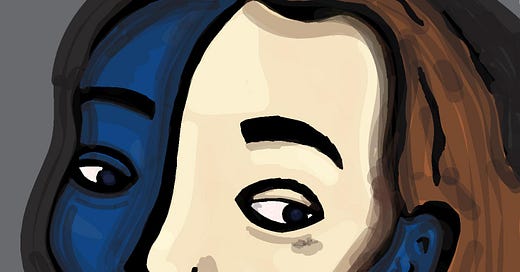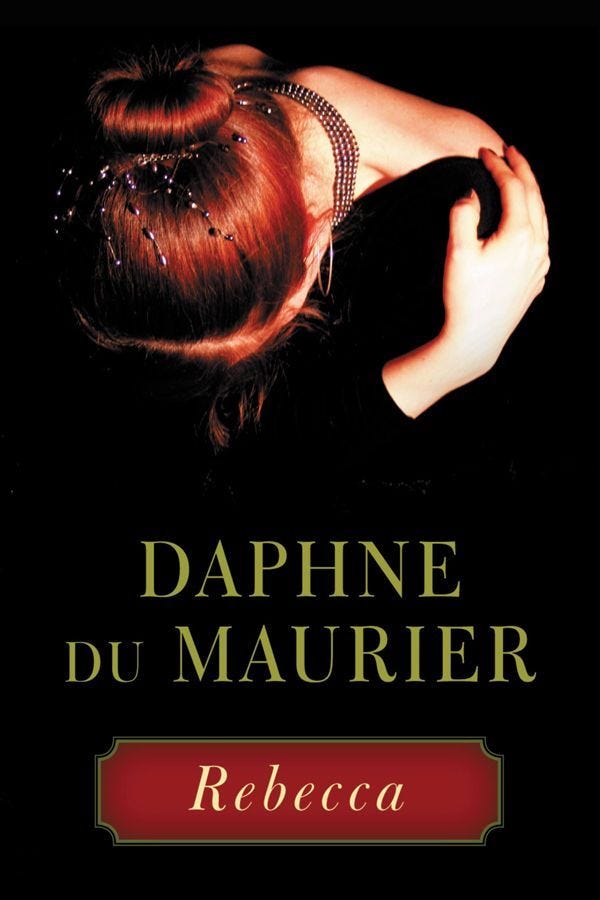The Meaning of the Looking Glass in Wide Sargasso Sea
Where we discuss the symbol of the looking glass in Jean Rhys' novel, Wide Sargasso Sea
On our most recent episode of The Novel Tea, we discussed Wide Sargasso Sea by Jean Rhys, and as Shruti discussed in last week’s newsletter, this book was overflowing with symbolism. Wide Sargasso Sea is a story inspired by Bertha Mason’s character from Jane Eyre by Charlotte Brontë, and a lot of the book can be interesting to analyze side by side with Jane Eyre. The looking glass is brought up often in this short novel and can be interpreted through various lenses. In this newsletter, I’ll dissect the symbol of the looking glass in my own way.
The main character of Wide Sargasso Sea, Antoinette, struggles with her identity. She is a Creole woman who belongs to neither the white Europeans nor the black Jamaicans. She comes from a family of former slave owners and, after the Emancipation Act, loses her wealth, class, and respect from the community.
“I got used to a solitary life, but my mother still planned and hoped - perhaps she had to hope every time she passed a looking glass.”
Looking glasses can symbolize self-image, especially for women where social status determines their identity. Antoinette’s mother, Annette, is reminded of her whiteness when she peers at her reflection, which reignites her hope to reunite with her former status in her community.
Tia is the daughter of Mailloutte, Christophine’s friend, and has an odd relationship with Antoinette. We are meant to believe that Tia is her only true friend, but their conversations use hurtful language. Tia shows her power and hate in multiple ways, and steals Antoinette’s clothes in an unusual altercation. After a targeted attack from the local Jamaicans, Antoinette’s house catches fire and she escapes with her family with great difficulty and panic. Amid the chaos, Antoinette sees Tia and seems to have a fleeting moment of relief before Tia throws a rock at her face and breaks the delusion of this friendship into pieces.
“Then, not so far off, I saw Tia and her mother and I ran to her, for she was all that was left of my life as it had been. We had eaten the same food, slept side by side, bathed in the same river. As I ran, I thought, I will live with Tia and I will be like her. Not to leave Coulibri. Not to go. Not. When I was close I saw the jagged stone in her hand but I did not see her throw it. I did not feel it either, only something wet, running down my face. I looked at her and I saw her face crumple up as she began to cry. We stared at each other, blood on my face, tears on hers. It was as if I saw myself. Like in a looking-glass.”
At this moment, I think it’s interesting to think about Antoinette’s desperation to find comfort in Tia. Being her only friend, Antoinette wants to see herself in Tia and assumes that they share the same experiences, and in some ways, should have the same rights. However, Tia doesn’t see a reflection of herself in Antoinette the same way.
Instead, Tia represents the stark contrast of Antoinette’s life, as she comes from a family with a sense of recent liberation and freedom. After the Emancipation Act, Tia is experiencing the world with an ease of mind that Antoinette cannot relate to because of her family’s declining status and societal expectations. Tia also mimics the community’s behavior towards former slave owners and shames Antoinette for her family’s struggles instead of giving her the empathy that she yearns for.
It’s this contradiction that Tia sees, but Antoinette does not, that breaks the illusion of their friendship. Tia throwing the stone at Antoinette is her cracking the distorted reflection between them, that never really should have existed in the first place.
We have no looking glass in the dormitory, once I saw the new young nun from Ireland looking at herself in a cask of water, smiling to see if her dimples were still there.
When Antoinette gets shipped off to school, this trajectory parallels the story of Jane in Jane Eyre. With no looking glass in the convent she attends, she misses the opportunity to remind herself who she is, similar to what Annette experienced when looking at her reflection in a looking glass. She has nothing to remind her of her roots, nothing to remind her of the person she is, and she begins to lose herself.
After these pivotal moments in the book, Antoinette’s sense of identity further crumbles. As she meets Mr. Rochester, the story becomes fragmented, like looking at yourself in a cracked mirror. Small pieces of Antoinette get lost, and her personality and behavior seem to split, like the multiple reflections off of a broken glass.
“There is no looking-glass here and I don’t know what I am like now... The girl I saw was myself not quite myself. Long ago when I was a child and very lonely I tried to kiss her. But the glass was between us – hard, cold, and misted over with my breath. Now they have taken everything away. What am I doing in this place and who am I?”
Mr. Rochester’s choices mirror Tia’s, and he tries to find a partner, wife, or friend in Antoinette but ultimately fails. Antoinette struggles to find a place to belong within this house with Mr. Rochester, after losing her sense of home in both her school as well as her childhood home. She also struggles to connect with her new partner and find friendship in the people around her, after leaving her community and the death of her closest family members. Like Tia, Mr. Rochester tries to strip Antoinette of herself and renames her Bertha near the end of the book, emphasizing the end of what we know of Antoinette, and the beginning of the story of Bertha.
When Bertha is taken away from her world, she enters her new identity, which we all know as “the madwoman in the attic.” It is here, in England, where she loses herself completely, she has no idea the person she is or was, and yearns for her childhood memories. With no name, Bertha loses her identity, and with no looking glass to see her reflection, she becomes a ghost of herself.
—Neha
Up Next
Tomorrow, we will be discussing Rebecca by Daphne Du Maurier. This episode is full of twists and turns, crazy themes, and deep analysis of the characters of this novel. We can’t wait for you to hear it! Tune in on March 26th, 2025.







